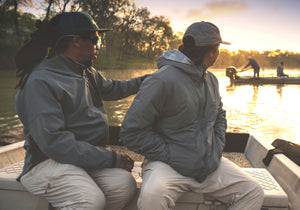Fly fishing is more than a pastime—it’s an evolving journey of skill-building, mindfulness, and connection with nature. But every angler, beginner or veteran, encounters challenges: plateaus, tricky water, missed casts, or even the mental hurdles that come with the sport. This guide weaves together expert advice from Orvis’s most insightful articles to help you grow your skills, deepen your enjoyment, and sustain progress.
1. Breaking Through Plateaus: Staying on the Path to Mastery
Hitting a wall in your progression is common in fly fishing. How to Break Through Plateaus and Keep Improving Your Fly Fishing Skills explains that plateaus often signal you’ve automated the basics but need refinement to move forward. Key strategies include:
-
Refining casting mechanics: Tighten your loops, smooth your stops, and revisit fundamentals.
-
Adding variety: Practice different casts like the double haul or roll cast to adapt to changing conditions.
-
Prioritizing presentation: A natural drift and stealthy delivery can matter more than the fly pattern itself.
2. Reading Water: Unlocking the River’s Secrets
Knowing where to cast is as crucial as how you cast. Orvis’s How to Read Water: Spotting the Best Places to Cast guides anglers to look for:
-
Current seams and breaks: Where fast and slow water meet.
-
Structures like rocks and logs: Prime ambush zones.
-
Surface cues: Rings and subtle disturbances hint at feeding fish.
Reading water transforms fishing from guesswork into a targeted, strategic experience.
3. Emotional Flow: The Mental Health Benefits of Fly Fishing
Fly fishing offers a profound mental reset. Orvis’s The Connection Between Fly Fishing and Mental Health explains how the sport blends mindfulness, problem-solving, and nature immersion to lower stress and improve mood. Each cast becomes part of a calming rhythm that fosters both focus and relaxation.
4. Improving Casting Accuracy: Hitting the Mark
Accuracy separates good anglers from great ones. How to Improve Your Fly Casting Accuracy suggests drills like:
-
Target practice on land: Using hoops or markers to build muscle memory.
-
Shortening your line: Perfect short casts first, then add distance.
-
Focusing on tracking: Keep the rod in a straight plane to hit precise spots.
Sharpening accuracy not only boosts catch rates but also builds confidence.
5. Family on the Water: Teaching the Next Generation
Sharing the sport creates lasting memories. Fly Fishing and Family: Teaching Your Kids to Love the Sport recommends:
-
Keeping it fun: Short sessions and easy wins maintain enthusiasm.
-
Simple setups: Avoid over-complication for beginners.
-
Celebrating small successes: Encourage every milestone to build confidence.
6. Handling Frustrations: Turning Challenges Into Lessons
Missed strikes, tangled lines, and tough days are part of the game. How to Overcome Common Fly Fishing Frustrations advises embracing mistakes as learning opportunities and slowing down when things go wrong. Patience and perspective keep the experience positive.
7. Hidden Gems: Exploring Lesser-Known Waters
Discovering untouched waters can reignite passion. Orvis’s The Hidden Fly Fishing Gems of the UK highlights overlooked rivers and lakes that offer solitude and adventure. Exploring these spots also hones your ability to adapt to new conditions.
8. Solo vs Group Trips: Choosing Your Experience
Solo Fly Fishing vs Group Trips: Pros and Cons outlines the trade-offs:
-
Solo trips: Foster focus, self-reliance, and quiet reflection.
-
Group outings: Build camaraderie, share knowledge, and add social fun.
Balancing both styles can keep your fly-fishing life dynamic and rewarding.
9. Fly Fishing Etiquette: Respecting the Water and Fellow Anglers
Good etiquette ensures a positive experience for everyone. Fly Fishing Etiquette: Unspoken Rules Every Angler Should Follow covers essentials like giving space, respecting private water, and practicing responsible catch-and-release. These courtesies sustain both the fishery and the community.
10. Maximising Short Trips: Quality Over Quantity
For anglers with limited time, Fly Fishing on a Tight Schedule: Maximising Short Fishing Trips provides strategies: pre-rigging gear, choosing accessible spots, and focusing on prime feeding windows. With planning, even a quick outing can be productive.
11. Preparing for Tournaments: From Hobby to Competition
For those ready to test their skills, How to Prepare for Your First Fly Fishing Tournament covers gear prep, scouting waters, and managing pressure. Competitive fishing can accelerate skill development and deepen respect for the craft.
12. Responsible Catch-and-Release: Preserving the Future
Conservation is at the heart of fly fishing. How to Handle and Release Fish Responsibly teaches best practices: wetting hands, minimizing air exposure, and reviving fish before release. Ethical handling ensures healthy populations for years to come.
13. Integrating It All: The Continuous Journey
To sustain growth and joy in fly fishing:
-
Revisit fundamentals regularly to avoid stagnation.
-
Study water carefully—let the river teach you.
-
Balance technique with mindfulness, using the sport as mental restoration.
-
Mix experiences—solo days, family trips, tournaments, and hidden gems.
-
Respect etiquette and conservation, protecting both fish and community.
Final Thoughts
Fly fishing is a blend of skill, patience, and connection—to water, to fish, and to yourself. By tying together lessons from Orvis’s expert resources, you can break through plateaus, sharpen your instincts, and cultivate a lifelong passion for the sport.
Every cast is a chance to learn. Every river, a new chapter. And every outing—whether ten minutes or ten hours—offers the opportunity to grow, both as an angler and as a person.

